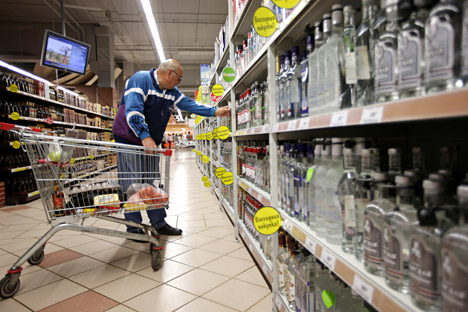
A higher excise tax on alcoholic drinks don't bring any significant success in decreasing alcohol consumption, according to experts. Source: RIA Novosti / Valery Melnikov
Russia’s budget revenues increased by almost 25 percent in the first three quarters of 2012 as a result of a higher excise tax on alcoholic drinks, according to the most recent Russian Federal Treasury statistics. If this rate continues, the Treasury will be in possession of an additional 250 billion rubles ($8 billion) by the end of the year. Alcohol consumption in Russia, despite the increase in retail prices, shows no signs of diminishing.
The state-backed alcohol reform of 2010 is bearing substantial fruit in the form of increased budget revenues from excise payments. In the first nine months of 2012, revenues from excise payments on the production and import of alcohol totaled 180.5 billion rubles ($5.8 billion). This is 24 percent more than in 2011 and twice the amount for the same period in 2007.
“Two factors influenced this dynamic,” said the Finance Ministry’s press service. “One: the indexation of excise taxes on alcohol. Two: changes in the system for paying excise taxes on alcohol, including the introduction of advance payments. Advance payments are made before the purchase of alcohol, which allows one to prevent the accumulation of arrears in excise taxes on alcohol.”
The Treasury statistics also show that the most significant increase in budget revenues has come from producers of strong alcohol. Between January and September of 2012, companies producing drinks that are more than 9 percent alcohol (not including natural wines) paid 40 percent more in excise taxes than last year ‒ 79.9 billion rubles ($2.6 billion).
The reasons for this are obvious: an excise tax that was raised by 18 percent on July 1, 2012 and an increase in the legal production of strong alcohol in the main categories (vodka by 10 percent and brandy by 25 percent).
Vadim Dobriz, director of the Center for Federal and Regional Alcohol Market Research (TsIFRRA), says that, by squeezing a considerable number of illegal producers out of the market, tough actions on the part of the regulator (Rosalkogolregulirovanie) have contributed significantly to the increase in collected excise taxes.
Almost half the total of excise-tax revenues comes from breweries. In the first nine months of 2012, they paid 89.7 billion rubles ($2.9 billion) in excise taxes, 19 percent more than the year before. By comparison, in 2007, breweries paid the government less that 20 percent of that sum ‒ only 17 billion rubles ($500 million).
TsIFRRA predicts that the sum of excise taxes paid on alcohol in 2012 will total 250 billion rubles, which is nearly 30 percent more than last year. Over the next three years, the cost of one liter of strong alcohol will increase to 500 rubles ($16). This will increase budget revenues from excise taxes on alcohol by 25 percent annually, according to Dobriz.
“We can say that the government has achieved a fiscal success with its alcohol reform,” Dobriz said. “Budget revenues are showing dynamic growth. With the regulator’s help, the presence of illegal alcoholic products on the market has decreased and the consumers of such products have been checked. They certainly will not be buying legal vodka for a minimum price of 170 rubles ($5.50).”
At the same time, Dobriz expressed the opinion that there has been no significant success in decreasing alcohol consumption.
“Users of legal strong alcohol next year will increase to 90-95 million people and thereafter will hover around this mark,” said the expert.
TsIFRRA estimates that the total number of consumers of legal alcohol in Russia is around 100 million. In the first nine months of 2012, every one of them paid the State Treasury 1,805 rubles ($58) in excise taxes on alcohol.
“The Union of Producers of Alcoholic Products (SPAP) does not share Mr. Dobriz’ optimism,” said SPAP chairman Dmitry Dobrov. “We fear that the substantial increase in the tax burden will drive consumers into the illegal sector. It’s great that the collection of excise taxes is increasing. The question is what this statistic will look like six months after the excise-tax hike takes effect.”
The article is abridged and first published in Russian in RBC Daily.
All rights reserved by Rossiyskaya Gazeta.
Subscribe
to our newsletter!
Get the week's best stories straight to your inbox